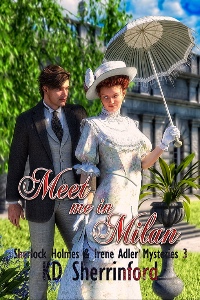While her husband, Sherlock Holmes, is off playing detective in London, Irene Adler finds herself having to turn investigator when her friend Renata becomes the prime suspect in the attempted murder of her husband, Luigi Amato. How can she refute the testimony of a credible eyewitness, even though her heart tells her that Renata is innocent? What she needs is tangible evidence, and she’s willing to do what she must to obtain it.
When Sherlock finally arrives on the scene, Irene seeks his counsel, and he agrees to assist with her investigation. However their relationship is called into question by Irene’s dear friend Sophia, who is not overly fond of Irene’s husband nor approving of the way in which they conduct their marriage. Will Irene be able to prove her friend Renata’s innocence, or is there a more tangled web of deception at play? And will Sophia’s misgivings regarding her marriage bear unfortunate fruit?

Shakespeare once acknowledged that words sometimes fail us, meaning that there must be moments in life when it is best to stay silent and keep our thoughts to ourselves. If only I’d followed that advice in the summer of 1905, then my life would have been far less complicated, and a simple misunderstanding would not have put me at odds with the man I adored.
Rehearsals had already begun at La Scala for Richard Wagner’s opera Das Rheingold. Touring Europe with the production in autumn, I was excited to play Erda, Mother of the Earth, while my friend Sophia would play Fricka. Fascinated by how music brought people together, and how a particular piece can transport one back to a memory, I had been fortunate to receive considerable acclaim and encouragement in my career as a contralto.
In opera, and especially acting, the element of acceptableness for women is miniscule. I will never forget the discourteous taunts that affected me profoundly as I battled my way to the top of the misogynistic world of my profession. Over the years, I’ve witnessed bullying and incessant racism towards my colleagues and myself in a male-dominated world, and I have often called it out. In addition to performing, I also valued my time teaching at the theatre school—working alongside the maestros, helping to inspire and shape the next generation.
It was the end of the school term. Violetta and Ludo Espirito kindly offered to take my children, Nicco, ten years old, and Charlotte, five, on a tour of Fiesole.
Before their trip, I decided we needed quality time together, a little light relief before the children embarked on their journey. Accompanied by Sophia and her children, Gabriella and Gianni, we took a carriage into town. First we visited the Galleria Vittorio Emanuele 11 shopping mall, where I bought Nicco and Charlotte clothing for their trip. Then, as a surprise, Sophia and I took the children to Parco Sempione, a striking public grassland adjacent to the lush gardens of the Sforza castle, an historical site and museum. We spent a wonderful afternoon with a picnic of bread, cheese, ham, lemonade, sweetbreads, and fresh fruit. Sophia and I sat on a blanket, our parasols shielding us from the glare of the afternoon sun, as we watched the children run around, screaming with glee.
Due to their eclectic knowledge far beyond their tender years, Nicco and Charlotte differed from the other children. However, they never allowed their superior intellect to interfere with their relationships with others.
As I watched the children play, I remembered the last time we’d come to the park, three months ago, after we’d returned from a family holiday in Rome. We had a wonderful time in the park, exploring the museum. Afterwards, Sherlock took us to the Duomo Cathedral, the pinnacle of gothic architecture and the largest of its kind in the world, which took over 500 years to complete. These were such fond memories.
Over the years, Sherlock and I had grown to love Milan with all its diversity and culture. We adored the art, poetry, and music of the city, apart from the many great operas we attended during our time there. We were also fans of the Ambrosian Chants, the first codified music in western culture. Sherlock and I agreed with Wolfgang Amadeus Mozart’s astute observation that music is not in the notes, but in the silence between.
After three months apart, the longest we had ever been away from each other, I missed my husband terribly. Even though we were both extremely busy with our careers, I still felt lonely at times. Sherlock and I kept in touch by letter or telegram. He sent me a single red rose every Monday in memory of our first meeting at La Scala.
I was thrilled to receive a letter from him a few days earlier, telling me to expect him home on Saturday. He would send a telegram to confirm his arrival later in the week, his usual custom. I could hardly wait to see him again. That incomparable feeling at the pit of your stomach, the excitement of knowing you would soon meet, those feelings remained as intense as when we’d first met.
We intended to spend a few days together in Florence, before travelling to Fiesole to meet the children and see our old friends. Ludo collected Nicco and Charlotte on Thursday morning in his new Panhard et Levassor automobile.
Charlotte stared up at me with her beautiful blue eyes, with an air of reflectiveness that Sherlock often remarked was quite extraordinary for a five-year-old. “Will Daddy be coming with you to collect us?” she asked.
I nodded. “Yes, he will. Your father is looking forward to seeing you both. First, however, I want you to be on your best behaviour for Ludo and Violetta.”
“We will, mother,” said Nicco. “We can’t wait to see Francesco.”
After hugging them, I watched Nicco and Charlotte climb into the car. Ludo checked they were correctly seated and comfortable before taking his place at the wheel. Turning to me, he said, “Don’t worry, Nene. The bambini will be fine with Violetta and me.”
“Thank you,” I said. “Please send my regards to Violetta. Tell her I look forward to seeing her soon.”
Holding back my tears, I watched the car until it rounded the corner and faded into the distance. I then made my way into the villa, located close to La Scala, on one of the prettiest streets in Milan, Via Torino. The villa looked stunning in the sunlight, with its blue verandas, expansive ornate gardens with topiary hedges, and immaculately kept flower beds. Despite the domestic servants pottering around the house, it felt quiet and empty without the children and my husband. Yet I could feel their presence in every room. I would miss Nicco and Charlotte and the sound of their infectious laughter. Still, I was comforted knowing I would see them soon, along with their father.




